Many of you may already be aware of the sustainability issues with Palm Oil and Palm Kernel Oil. Palm oil is grown on vast plantations in Malaysia, Indonesia, and many other South Asian and African countries. Due to the ever increasing demand for Palm Oil in both the food industry and booming biofuel production, more land is needed every year for more oil palm trees. Some unscrupulous plantations clear surrounding rainforest and peat for this land illegally, which has led to the destruction of orangutan habitat and local land conflicts in some areas. Palm Oil and Palm Kernel Oil (PKO) are used in soapmaking as secondary lathering agents and also contribute to a hard bar of soap.
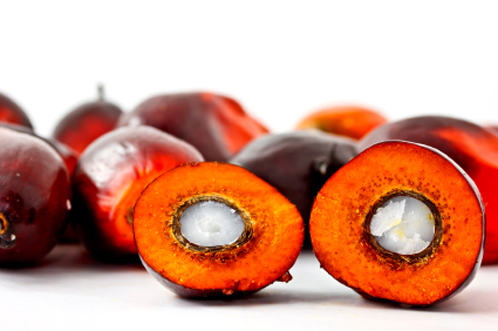
Palm oil is mostly used in the food industry to manufacture cheaper, healthier foods. Palm oil is efficient, cholesterol free, and high in carotene. The #1 use of palm oil is in the food industry, and most of the “vegetable oil” in foods in the grocery stores are made with palm oil! However, industrial use of palm oil, such as for biofuel, is on the rise (especially in Europe).
But, the United States only imports 3% of the world’s palm oil; most of it is used in Malaysia, Indonesia and China as a cheap cooking oil, and as a biofuel to help reduce emissions. It is also a critical factor in these economies, comprising a large part of international exports and GDP.
Can you make a good bar of soap without Palm Oil? Yes, yes and yes! And, over the next few months, the Soap Queen blog is going to explore fully-tested Palm-free recipes. I’ve made 20+ different recipes, passed them out to testers, and have gotten the results back. I can’t wait to share them with you! Even with this experimentation, Bramble Berry continues to carry palm oil and use it in our recipes and projects for a variety of reasons outlined in this post (below) but we do so in the most sustainable manner possible. Simply removing palm oil from the entire cosmetics industry (including the Proctor and Gamble’s of the world) would only remove a mere 5% – 10% of industrial demand on palm oil. Instead, Bramble Berry only purchases palm oil from vendors who are members of the Roundtable for Sustainable Palm Oil, also known as the RSPO.
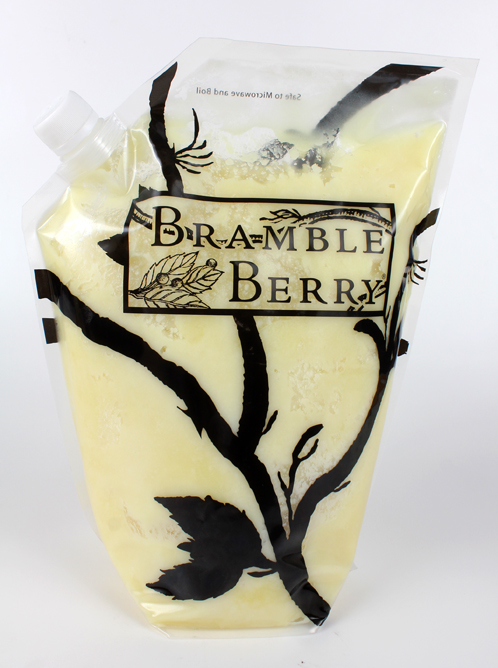
The RSPO was founded in 2005 to create a system for certifying sustainably grown palm oil, and to create guidelines of membership for certified growers. These guidelines cover more than just environmental stewardship; members of the RSPO must report on and provide better working conditions, better wages, and foster local discussions and input on their impact on local and native land. These principles and criteria for members of the RSPO help ensure that the certified palm oil is produced under legal, socially and environmentally responsible management. The World Wildlife Foundation has given the RSPO a thumbs up as a big step in the right direction for the production of palm oil in “providing assurance that valuable tropical forests have not been cleared, and social safeguards have been met during the oil’s production” of Certified Sustainable Palm Oil.
But why not do away with palm oil altogether? Palm oil is not only used in commercial foods and biodiesel. Palm oil is the primary cooking oil for some of South Asia and Africa’s poorest. A shortage of palm oil, or simply an increase in prices, can cause impoverished families in India to cut back on food just to buy the oil to cook it with. (See blog post here for more information.) Palm oil plantations also provide much needed jobs in rural areas where impoverished families struggle to feed their families and make a living. In fact, the World Bank rated the palm oil industry as the best way to reduce poverty in Malaysia, and the palm oil industry has been credited with creating a new rural middle-class in Indonesia.
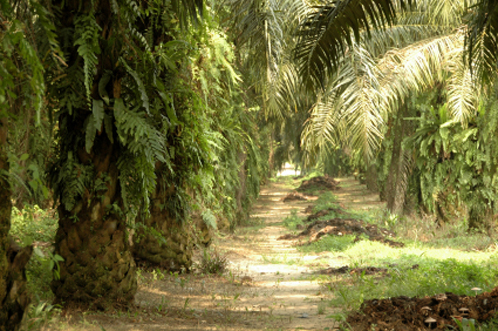
While over 50% of palm oil plantations are run by corporations, 40% of Indonesian plantations and 47% of Malaysian plantations are held by small holders. The Malaysian palm industry employs over half a million people, and that number grows every year, lifting more and more families out of poverty.
Simply cutting back on palm oil production, or forcing food and biofuel producers to make a large scale switch, could cause greater sustainability issues with oils such as canola, soy, and sunflower. Because the oil palm has such a high oil yield per hectare, a massive switch to smaller yield oils like canola could cause even more land to be cleared and more forests to be burned.
Sustainability is never an easy issue. Rarely is it as simple as saying “We just won’t use that anymore.” The key to the sustainability of palm oil is to create a better system for monitoring plantations, segregating ethically grown palm in the marketplace, and creating more affordable certified palm oil. By continuing to support only RSPO-certified vendors, Bramble Berry is doing its part to help fund the fight for better palm oil along with some pretty big industry giants such as General Mills and Kellogg. Bramble Berry also supports Orangutan Foundation International, a non -profit organization that purchases land in the Rawa Kuno National Forest to create permanent and protected orangutan habitat. (Buy your own piece of the forest here!)
So what can you do aside from purchasing sustainable palm oil? Start at the grocery store. Look through the ingredient labels of the products you’re purchasing and start to become aware of Palm Oil on the ingredients labels. If you’re a larger soap business that wants to continue using Palm Oil and PKO, you may consider supporting the RSPO and GreenPalm through their certificate purchase system (similar to purchasing carbon offset credits). However, membership can be pricey, so if you’re looking to make a more affordable contribution to the fight for better palm oil, you can also make a monthly donation of any size to the World Wildlife Federation here or purchase your own piece of forest land through Orangutan Foundation International.
The choice to use palm oil in your soaps is up to you. It is 100% a personal preference and like many soapmaking issues (to gel or not to gel, INS numbers, sodium lactate usage), what one person swears by, another will eschew. There are many soapmaking alternatives to using Palm Oil/PKO and great palm-free recipes out there, and we are currently testing more for you that are long lasting, hard and have copious bubbles. The road to truly sustainable and socially responsible palm oil is a long one, and we’re all in it together.
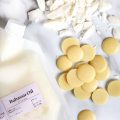

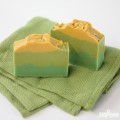


Please Note: There is no sustainable way to purchase palm oil, even organic, The Rain forests are being destroyed, no matter where in the world it is sourced. When soap supply companies stop selling Palm oil, and any other palm oil derivative. I will go back to making soap. Until then I will not buy from any company who sells it. Amanda you are a business, you could easily suggest other oils such as Hemp oil. As the Rain Forests are destroyed, so are species of living creatures dying off, and that will be it for them. Bramble Berry Could easily suggest other oils while removing Palm Oil from your Website. We need more brave souls to stand up and say no to palm products.
Hi Minty!
Thank you for your thoughtful comment. Choosing ingredients to make soap is a personal one, and we try our very best to give as much information and resources to make informed decisions. You can certainly choose to not use Palm Oil. We have several cold process recipes that do not use Palm Oil 🙂
Palm Free Vertical Twist Tutorial:
http://www.soapqueen.com/bath-and-body-tutorials/cold-process-soap/palm-free-vertical-twist-tutorial/
Palm Free In-The-Pot Swirl:
http://www.soapqueen.com/bath-and-body-tutorials/cold-process-soap/a-palm-free-in-the-pot-swirl/
Easy Cold Process Soap Rocks: http://www.soapqueen.com/bath-and-body-tutorials/cold-process-soap/easy-cold-process-soap-rocks-palm-free/
-Amanda with Bramble Berry
Thank you everyone for all your comments and concerns regarding Palm Oil.
We wanted to give an update to recent information we have found that supports our beliefs with Palm Oil. This matter is very dear to us and we believe in the betterment of our world and the way we all live in it.
World Growth has some wonderful principles that share in our same beliefs of sustainability and development in using Palm oil with their Palm Oil Green Development Campaign.
1.) Alleviating Poverty through Wealth Creation
Palm oil provides developing nations and the poor a path out of poverty. Expanding efficient and sustainable agriculture such as Palm Oil Plantations provides small and large plantation owners and their workers with a means to improve their standard of living.
2.) Sustainable Development
Sustainable development of palm oil plantations and growth of the palm oil industry in developing nations can and will be achieved through consultation and collaboration with industry, growers, lobby groups and the wider community.
3.) Climate and the Environment
Palm Oil is a highly efficient, high yielding source of food and fuel. Palm Oil plantations are an efficient way of producing fossil fuel alternatives and capturing carbon from the atmosphere.
4.) Opportunity and Prosperity
Developing nations must be allowed the chance to grow and develop without political intervention by environmental groups or developed nations. It is crucial that developing nations be given the same opportunities which developed nations have benefited from.
5.) Property Rights
Efficient palm oil plantations and the growing demand for palm oil give smaller land holders greater opportunities to make a living off their land, maintain their ownership and support their rights to property and prosperity.
To learn more World Growth and the Palm Oil Green Development Campaign, be sure to check them out at http://worldgrowth.org/issues/palm-oil/.
-Amanda with Bramble Berry
Thanks for the suggestion on lye heavy soap. I was browsing different websites, and from one of the site i found this detail
Palm Olein (SAP: 194-202)
Palm Oil (SAP: 190-209)
As the range is almost identical i think my recipe might work. But as i had used palm olein it might be a soft soap i believe
Thanks
Akila
Hi Akila!
Since your ingredient was in the same SAP range, it should be okay, but I would double-check it with the zap test once it has hardened. Keep us updated, we’d love to know how it turned out. =)
-Becky with Bramble Berry
Hi
I prepared two batches of soap, using palm olein instead of Palm oil. But unfortunately i used the SAP value of palm oil 0.141 while calculating lye amount :-(. I think SAP value of palm and palm olein differs. But i missed this.
Will my soap batches go waste now? 🙁
Kindly advice
Thanks
Akila
Good morning, Akila!
If you think that your soap is lye heavy, we suggest doing the zap test to make sure. A zap test is when you lick a small part of your soap like you would a 9-volt battery, and if it zings, it is lye-heavy. But, you don’t have to waste it if it is lye-heavy. We have a great laundry soap recipe specifically created for lye-heavy soaps, you can find it here (it is the first one):
http://www.soapqueen.com/bath-and-body-tutorials/home-crafts/three-diy-laundry-soap-recipes/
I hope that this helps! 🙂
-Becky with Bramble Berry
Hi!! Can we use palmolein in place of palm oil?will it make any difference?
Hi Shivani!
Palm Olein and Palm Oil are going to be two different ingredients in your cold process soap. Palm olein is the liquid component of palm oil obtained when the oil is separated by a process called fractionation. Changing it will affect your soap, and it may end up being softer than you would like.
We would suggest sticking with Palm Oil in your recipes, or use Coconut Oil if Palm Oil isn’t going to work for you! Is there a specific reason you wanted to use one over the other?
Palm Oil: https://www.brambleberry.com/Palm-Oil-P3210.aspx
-Becky with Bramble Berry
Re: “Palm oil plantations also provide much needed jobs in rural areas where impoverished families struggle to feed their families and make a living. In fact, the World Bank rated the palm oil industry as the best way to reduce poverty in Malaysia, and the palm oil industry has been credited with creating a new rural middle-class in Indonesia”….
As an anthropologist, I find this snippet troubling. The World Bank is not a humanitarian organization; it is a very, very large and powerful bank. Its model of “development” has raised everything from eyebrows to massive protest movements, due its tendency to reproduce colonial patterns of economic relationships (on the same global scale), and for its tendency to lock in wide swathes of the world’s population into poverty, rather than liberate them from it. The World Bank is certainly not a reliable source of information about what is and is not environmentally sustainable, as its own projects are notorious for destroying local ecosystems.
It sounds like the RSPO is probably a positive step away from at least some of the damage that actors like the World Bank have helped to cause, and it’s great to hear that Bramble Berry has taken steps to source its palm oil responsibly.
However, it’s irresponsible for this post to imply that soapmakers who decide boycott palm kernel oil might be unwittingly complicit depriving impoverished people in Asia of work or food. This suggestion takes for granted a narrow –and I’m afraid very naive– view of what causes poverty and how poverty can be eliminated. There are many, many elements of our economic relationships to our fellow human beings (and our treatment of our planet) that should legitimately fill us with horror. However, the decision to boycott palm oil is not one of them.
Thanks for your note Laura. It’s exceedingly well written (the second to last sentence is particularly great).
Palm kernel oil and Palm oil are two different oils but I totally get your point. I’m always amazed when I find out that over 97% of the production of Palm in the world goes to food and biofuels (!) so when I shop, I try to take positive steps in the grocery store to make choices that best reflect my values there too.
We’re proud to buy RSPO Palm and have applied for membership in the organization ourselves to ensure that our supply chain stays as clear as possible.
Hej from Sweden!
I have a website and speak about Palm Oil and RESPO. After reading your post here, I would love to use one of your paragraphs to add to my own about Respo. You give a much more detailed account of what RESPO does and its wonderful.
If you wouldn’t mind and respond to my email.
Thanks Gullringstorpgoatgal
Good afternoon!
We’d love to check out your site so that we can give you a bit more information. Just link us to it and we can get back to you. =)
-Becky with Bramble Berry
That was a fantastic post! Thank you!
Anne-Marie thank you for this article. I rarely use Palm Oil and qpuld gladly share my recipes if you want them.
Thanks for the awesome offer, LadyHawk! If there are any recipes you’d like to share with us, you can e-mail them to info(at)brambleberry(dot)com. In the meantime, you can see the palm-free recipes that we’ve started to do:
A Palm Free In-The-Pot Swirl: http://www.soapqueen.com/bath-and-body-tutorials/cold-process-soap/a-palm-free-in-the-pot-swirl/
Palm Free Vertical Twist Tutorial: http://www.soapqueen.com/bath-and-body-tutorials/cold-process-soap/palm-free-vertical-twist-tutorial/
Happy Soaping!
-Becky with Bramble Berry
Thank you for sharing! I am currently coming up with a product line that I am LLCing that advertises NO palm oil, however it is nice to read that you use a sustainable batch of palm oil, but it still makes me nervous. I want my soap to be environmentally friendly and as natural ass possible. I also think I enjoy a little softer soap anyway. Other than working out some kinks with natural colorants, I have had total success with the actual recipe of non palm oil soap thus far! I’ll share some of my awesome palm oil free recipes if you help me with all natural colorant tips (i’m a chemist!) 😉
Hi Andrea!
Thanks so much for that offer! We are actually starting a whole palm-free series for our customers who don’t want to use it. You can find them here:
A Palm Free In-The-Pot Swirl: http://www.soapqueen.com/bath-and-body-tutorials/cold-process-soap/a-palm-free-in-the-pot-swirl/
Palm Free Vertical Twist Tutorial: http://www.soapqueen.com/bath-and-body-tutorials/cold-process-soap/palm-free-vertical-twist-tutorial/
We can’t wait for you to start using natural colorants, here are a couple of great resources you could take a look at:
Natural Colorants Online Video: https://www.brambleberry.com/Natural-Colorants-Online-Video-P5039.aspx
E-Book Infusing: Herbs, Spices, Teas & Clays: https://www.brambleberry.com/E-Book-Infusing-Herbs-Spices-Teas-Clays-P5040.aspx
Infusing Kit: https://www.brambleberry.com/Infusing-Kit-P5038.aspx
As well as some blog posts that can give you some inspiration and ideas about natural colorants:
Make It Monday: #Natural Colorants: http://www.soapqueen.com/bath-and-body-tutorials/cold-process-soap/make-it-monday-natural-colorants-and-infusing/
Sea Clay Avocado Facial Bar: http://www.soapqueen.com/bath-and-body-tutorials/cold-process-soap/sea-clay-avocado-facial-bar/
Swirling Alkanet Infusion: http://www.soapqueen.com/bath-and-body-tutorials/cold-process-soap/swirling-alkanet-infusion/
Gardening Cold Process Soap: http://www.soapqueen.com/bath-and-body-tutorials/cold-process-soap/gardening-cold-process-soap/
Going Vertical: http://www.soapqueen.com/bath-and-body-tutorials/cold-process-soap/going-vertical-2/
#Natural Colorants Winners!: http://www.soapqueen.com/bath-and-body-tutorials/cold-process-soap/natural-colorants-winners/
I hope this helps! 🙂
-Becky with Bramble Berry
I know your palm oil supplier is from a member of the Roundtable on Sustainable Palm Oil (RSPO), but that is MUCH different than actual Certified Sustainable Palm Oil (CSPO). As stated before in these discussion, anyone can be a ‘member’ of RSPO despite their current practices (which can be devastating to animals and the environment). Actual CSPO is monitored and produced by sustainable methods and practices that do not damage the environment. I didn’t realize the difference until throughly combing through the RSPO website.
I thought Brambleberry carried CSPO, but now I’m assuming it isn’t or else it’d be labeled as such. I’d love to see CSPO available though, because after much research just being a RSPO member isn’t go enough for me! …and I kind of wish I could return my latest Palm Oil purchase since I won’t be using it.
Thanks for your feedback. We’re looking into a variety of more stringent certifications to see the feasibility of that supply chain for our needs. =) And in the meantime, we’ve got some more palm-free soap recipes coming up if you’re looking for some more tried’n’true palm-free recipes.
Anne-Marie,
Thank you so much for addressing this issue, as I too have been grappling with the use of palm for my business. I appreciate the explanation you gave and the points you brought up as well as the points your readers brought up, too! I am so very glad to hear that Brambleberry only purchases palm oil from vendors who are members of the Roundtable for Sustainable Palm Oil. Personally, I have made the decision to continue using Palm Oil and purchase it through you where I can be sure that it was produced ethically. I do not use Palm Oil in my home for food use however, as I cannot be sure where it comes from. Great article, great topic! Thank you!
Fantastic article! well done…..
Anne-Marie,
it’s a great post as I previously wrote. I admire your courage and your civil responsibility as a businesswoman and a supplier.
You’ve stuck your finger into wasp’s nest (it’s something we express in German, I hope it has the same meaning in English). It’s really a burning subject at the moment but I personally feel that almost over 80% of those who call and claim for palm free, do not really know what they’re talking about. It’s only a matter of fashion. I’ve even seen many soap recipes or labels claiming their palm free soaps and having palm kernel oil in the same recipe. They even do not know Palm and palm kernel oil are both derived from the same plant.
I personally can not yell for palm free soap and cry for orangutans and the poor inhabitants who have lost their homes by the palm oil industry and buy cheap jeans and T-shirts which are produced under inhuman situation in Bangladesh or Vietnam or elsewhere, or buy cotton which is produced under same inhuman condition and most often by child labour at the same time. It remind me of the celebrity posing naked for PETA and hiding their own fur coats in the closet.
You know, following a fashion blindly, no matter if it’s a fashion of dressing dictated from Paris or Milan, or fashion of avoiding parabens or avoiding palm, or fashion of avoiding meat, without knowing what one is really doing is dangerous and is irresponsible. I’m sure you’ll receive more (let’s say non friendly) comments such as the one in above, (which from my point of view is as well advertising for the own institution). Go on, head up, you’re on the right trace. Inform your readers about pros and contras and it’s their choice if they do use a certain ingredient or not, but at least , THEY’LL KNOW WHY THEY DO IT
So glad you are looking towards sustainable oils. I’ve been writing on the subject in the Saponifier and on my blog for over a year now. I know there are a lot of soapmakers on the palm-free bandwagon, but how many of these people trying to do what they feel is right are contributing to the other 90% of the demand in their kitchen cabinets?
I feel we need to keep working towards sustainability. If you continue to educate people about the problem and insist of truly sustainable products, we will eventually make a difference. Right now it’s baby steps, and that’s where it starts.
Very helpful information on a very touchy subject. Thanks for a very objective point of view.;-D
Thank you Anne-Marie. This topic can polarise people – many of whom have only heard that “palm oil is bad because it kills orangutans” (as one lady said to me). You have provided a well reasoned, clear and concise explanation that I will be happy to share with my customers xxx
Great post, we started using palm free recipes within the last year and offer palm free soaps for those who prefer it. We also offer palm soaps and I’m on the fence whether to continue with palm once my supply runs out. The biggest issue I have with palm free soaps is getting certain essential oils to stick such as citrus ones like Bergamot. They seem to fade so fast with my palm free recipes even though I add the maximum scent and clay. Also I find palm free soap doesn’t last as long as my palm soaps do.
Looking forward to your future posts on this issue.
P.S. Love your palm oil packaging, it’s beautiful.
I’m very glad to see the interest in palm-oil free recipes is taking off.
I’ve been making soap without palm oil for over a year now, and no one seems to miss it.
Great read! Thank you for sharing. I always buy my palm oil from you! I look forward to learning more about your tested alternatives too!
Thank you for the palm oil-free series! It’s a nice change for your blog. And, please consider looking at animal fats. So much fat is thrown away because no one wants it, and it is, in most parts of the US, the only source of local fats for soap making. Promoting it wouldn’t be profitable for you, as soapmakers need only drive to the nearest farm to pick some up, but it would be a great way to promote soap making for people who can’t afford fancy oils and/or are trying to live more sustainably and buy local.
There’s a lot of factually incorrect information in here that seems like it was copied or paraphrased directly from the Roundtable on Sustainable Palm Oil website. First off, the soap industry should be aware WHAT the RSPO is…it is a palm industry-dominated body that has completely failed to develop truly deforestation free sources of palm oil. There are committees within the RSPO trying to get them to stop certifying palm plantations that clear and burn rainforests, but those proposals have for years been blocked by the palm industry, so most observers have given up hope that there will be significant change. While there are many loopholes in RSPO certification, the most important one is that they actually certify plantations grown on recently cleared rainforest…so long as that rainforest is classified as “secondary.”
To put that in perspective, 67% of rainforests in Asia are secondary, which generally means there’s been some human impact in the past, even just a single log taken out of a few hectares 25 or 40 years ago. These “secondary forests” in many or most cases have just as many orangutans, tigers, and Sumatran rhinos in them…and all the other features of forests as so-called “primary forests” that RSPO says it excludes.
Additionally, soap buyers should be aware that mere membership in RSPO is essentially meaningless; it does not obligate the company to buy RSPO’s so-called “sustainable” oil, but merely pay a $2000 annual fee that goes to RSPO administration. In other words, you’re buying the same palm oil as everybody else is using from dead rainforests. Companies that use deforestation based oil, whether certified by RSPO are not, are exposing themselves to potential negative scrutiny from NGO’s and environmentally concerned consumers.
There are some emerging possibilities for deforestation free palm oil. The Rainforest Alliance, an actually credible certification organization that does not include RSPO’s bogus certification of secondary forests has recently started certifying palm plantations that meet its high standards. Also, Golden Agri-Resources, the world’s largest private-sector palm producers, has committed to a strong deforestation-free policy on its 400,000 hectares + of plantations in an agreement with Nestle, the Tropical Forest Trust and Greenpeace. Initial signs are that this agreement is being implemented, though warrants additional monitoring.
Finally, this blog post gets the economics of palm oil completely wrong, suggesting that a move away from palm oil by buyers will somehow cause palm oil prices to increase. Uh, no. The opposite is true. Lower demand will LOWER prices, making palm more affordable as a cooking oil. Soap makers who use palm oil are the ones driving up the price and making vegetable oil prices higher. By eliminating palm oil from their recipes, soap makers can not only alleviate global hunger, but those lower prices mean there’s less of an incentive for deforestation for new palm oil plantations. HIGHER prices = more deforestation.
While any vegetable oil can have ecological consequences, let’s be clear: the way the palm oil industry operates right now is FAR more destructive than any other vegetable oil in ways that trump the greater yields produced by palm oil. Deforestation for soy in the Brazilian Amazon has been reduced to almost zero; rapeseed/canola oil is not grown in high biodiversity tropical areas; and coconut oil is typically grown intercropped rather than in giant monoculture plantations, meaning that no land clearance is required to produce it (it also has most of the same chemical and end-user characteristics as palm oil).
In collaboration with the Union of Concerned Scientists and University of Massachusetts, our organization Climate Advisers, has put together a comprehensive report on the different options for companies that want to shift to deforestation free vegetable oil. It also includes a fact-based analysis of the variety of ecological, economic, agricultural, and market forces at play in the palm oil industry. I hope Bramble Berry and other soap users will read it; and we’re happy to help companies who want to change their formulas to actually go deforestation free. It’s available here:
http://www.ucsusa.org/global_warming/solutions/forest_solutions/deforestation-free-vegetable-oils.html
Thanks,
Glenn Hurowitz (hurowitz [a/t] climateadvisers {dot} com)
Thanks for the additional information, especially about the secondary rainforest stuff. I’ll be sure to check out the Rainforest Alliance certification as well as the Tropical Forest Trust to see if we can continue to shore up our supply chain even more. And in the meantime, we’re moving ahead with our palm-free soapmaking series so that soapers that wish to soap palm free have some alternative recipes to start with.
Great news. Let me know if we can be of any assistance. Best Wishes, Glenn
While some of your information is true regarding flaws in the RSPO, it is a start. Boycotting is not the most responsible way to handle the deforestation of these regions of the world. Why not boycott?
• Because palm oil makes 10 times the amount of oil per unit area as soybeans, grape seeds or sunflowers, it is actually more environmentally friendly to use because of this.
• Poverty stricken Indonesia and Malaysia rely on palm oil for their economies. Boycotting would devastate these communities rendering many people unemployed.
• If you boycott one type of oil, another will just take its place. Whereas using a sustainable oil is a win-win situation.
Anne-Marie is correct about cosmetics/soap being a small fraction of the palm oil demand. Most is in food like chocolate, crackers, etc. I know there are a lot of soapmakers on the palm-free bandwagon, but how many of these people trying to do what they feel is right are contributing to the other 90% of the demand in their kitchen cabinets?
I feel we need to keep working towards sustainability. If you continue to educate people about the problem and insist of truly sustainable products, we will eventually make a difference. Right now it’s baby steps.
Interesting point, something for me to think about.
Great article, Anne-Marie! Just last week I was considering writing a similar blog post. I like to use palm oil in my soap, and sustainability is important. I love knowing that Bramble Berry’s palm oil is sourced from the RSPO. Palm oil is in so many products and, like you say, it seems that an outright boycott will not solve the problem and could tip the scales in another direction. Producing palm oil in a responsible, sustainable way not only protects the environment and wildlife, but also provides better wages and living conditions for the growers. Thanks for the information!
Use of palm oil absolutely does *not* protect wildlife. It’s is destroying the very specific habitat of the Orangutan and is greatly endangering their survival as a species. Also, the creation of palm plantations means the creation of monoculture (monocrop agriculture). This is bad for bio-diversity in every way, including for many species besides the Orangutan. Locals lose their own means of livliehood, and these places don’t have fair wage guidelines, or things like OSHA guidelines. Having one large, sole employer in an area is not good for workers as human beings, or for their local economies.
Thank you for writing this! I personally don’t use Palm anymore and have tried to avoid stearic acid as well since it is sometimes derived from palm sources. My only concern is with green washing. It is a valiant effort that the RSPO is making but it is not a guarantee. Here are some more articles to check out in relation to sustainable palm oil practices, implementation, and the effects of the demand for palm oil. I *personally* feel that even 5-10% is something. To each their own, but it is definitely a topic worth thinking and rethinking.:
http://allafrica.com/stories/201207260770.html
http://www.thejakartaglobe.com/nvironment/its-either-orangutans-or-cheap-palm-oil-analysts/537772
http://uk.reuters.com/article/2012/07/12/us-indonesia-forests-idUKBRE86B0AO20120712
Thanks for that, I am on the beginning end of soap making, but my reasons were with this kind of issue in mind. Makes me feel more comfortable with the companies I choose to buy from, knowing where they stand and that they actually stand for something aside from the dollar signs. Much appreciated.
oddly enough, i never use palm oil. just coconut and olive. great article though!
Great article 🙂 Love all your detailed explanation.
Thank for for this detailed post.
Finally somebody who thinks about all aspects of applying a certain ingredient or do not applying it and does not follow hysterically the media which see only one side of the card.
I hope you can make people THINK more deeply and refer to their own sense and judgment and avoid following blind the fashion of applying this and this and avoiding that and that.
Education IS a good thing. Thanks for sharing your insights and knowledge.
Coincidentally, I started writing a blog post tonight about my personal thoughts on soaping oils, including palm. Thanks for all the interesting, timely information!
Let me know when it’s up – would love to read your perspective =)
As usual, a great source of information! Thanks for providing a better understanding of the issue.
It’s really nuanced and extremely controversial right now on some soapmaking forums. But, despite that, education is always a good thing! =)
i use organic palm oil and organic palm kern oil, from AGROPALMA, from Brasil…..see more in http://www.agropalma.com.br
Thanks for the lead, Beth. We’re always looking to have multiple vendors (it’s always a good idea to have back ups).
How do you purchase from them as the website is all in Brazilian? Thanks .
[email protected]
Hi Julia!
If you click on their website, you can actually translate it into English. On the top menu bar there is a little American Flag. If you click on it, it will translate the website for you. I hope this helps! 🙂
-Becky with Bramble Berry
Hello Julia
You can purchase palm oil from Agropalm here in USA. The company who distribute is called Ciranda (www.ciranda.com). But they sell in drums. You can also read this info: http://www.ciranda.com/sites/ciranda.com/files/CIRANDA%20PalmFruit%20Sustainability%20April%2009%20-%20without%20RAN%20for%20website.pdf
Soaperschoice.com also sells sustainable palm oil, which is from Colombia.
Thank you so much for this!
Always happy to help =)
Thank you Anne Marie for a wonderful explanation !
And thanks for reading all of it! I know it was long one =) It is definitely a complicated, nuanced issue.